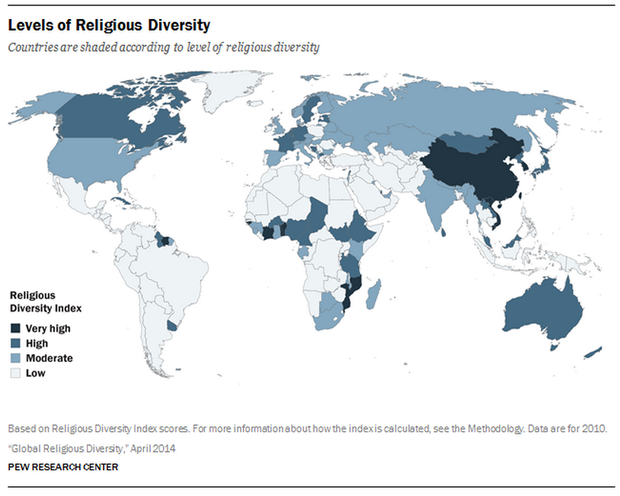Religion
Related: About this forumThe Link Between Religious Diversity and Economic Development
Economic success may be tied to the fact that not all of your neighbors are celebrating the same winter holiday as you.
Richard Florida | 7:35 AM ET
The holiday season is a time when people all over the world reflect on the role of religion in their lives. But how does religion, and especially religious diversity, affect our economies?
I decided to take a look using data from the Pew Research Center’s Religion & Public Life Project on “global religious diversity.” The Pew data track the level of religious diversity, measured as the percentage of the population that belongs to eight major religious groups in countries around the world. These include the five major world religions—Buddhism, Christianity, Hinduism, Islam, and Judaism—which account for about three-quarters of the world’s population, as well folk or traditional religions, the religiously unaffiliated (atheists, agnostics, etc.), and other religious groups (Baha’i, Sikhism, Taoism, etc.). The study ranked countries on a 1 to 10 scale based on their having a more equal share of these religious groups.

The map above, from the report, shows the pattern of religious diversity worldwide. There are some surprises here. Though the countries with the least religious diversity are obviously the least secular—Vatican City, Afghanistan, and Iran are all near the bottom of the list—religious diversity or pluralism clearly does not result in secular values. Six of the twelve countries that scored very highly on their diversity ranking are in the Asia-Pacific region: Singapore, Taiwan, Vietnam, South Korea, China, and Hong Kong. Five more are in sub-Saharan Africa—Guinea-Bissau, Togo, the Ivory Coast, Benin, and Mozambique. South America’s Suriname rounds out the top dozen.
With the help of my Martin Prosperity Institute (MPI) colleague Charlotta Mellander, I dug a little deeper into the ways that religious diversity might be associated with economic performance. As usual, I note that correlation does not imply causation, and ultimately one would want to control for the effects of religious diversity alongside other variables in multivariate analysis. Still, five key findings jump out from this analysis.
http://www.citylab.com/politics/2014/12/the-link-between-religious-diversity-and-economic-development/372585/
cbayer
(146,218 posts)when you look at why one place may be highly diverse and others not at all.
The correlation between economic status and religiosity seems clear and makes sense, but I'm not so sure about this one.
safeinOhio
(32,676 posts)between sexual discrimination, both male vs female, and against gay vs straight and economic success by country.